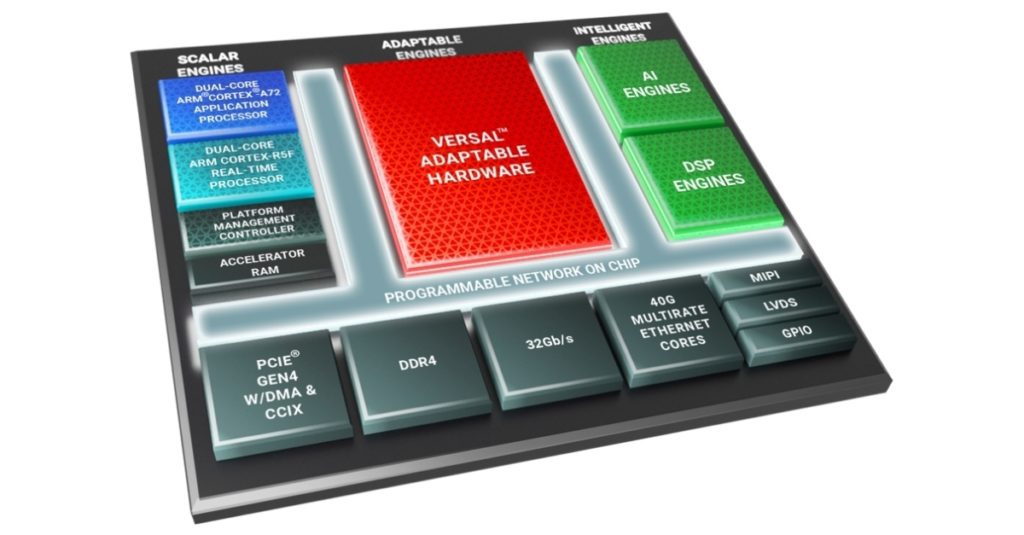SAN JOSE, CA.– (BUSINESS LIFE) – Xilinx, Inc. (NASDAQ: XLNX), the leader in adaptive computing, today introduced the Versal ™ AI Edge series, designed to enable AI innovation from edge to endpoint. With 4X AI performance per watt compared to GPUs1 and 10 times the density of calculations compared to the adaptive SoC of the previous generation, the Versal AI Edge series is the most scalable and adaptive portfolio in the world for distributed next-generation intelligent systems.
Versal AI Edge Adaptive Computing Acceleration Platforms (ACAP) provide intelligence for a wide range of applications, including: automated driving with the highest levels of functional safety, collaborative robotics, predictive factory and healthcare systems, and payloads for many aerospace and mission missions defense markets. The portfolio includes AI Engine-ML to deliver 4X computing for machine learning compared to the previous AI Engine architecture and integrates new accelerator RAM with an improved memory hierarchy for evolving AI algorithms. These architectural innovations provide up to 4X AI wattage per GPU and lower latency, resulting in far more capable edge devices.
Automated systems with activated AI require high computing density, which can accelerate entire applications from sensor to AI to real-time control. Versal AI Edge devices achieve this by providing 10X computing density compared to Zynq® UltraScale + ™ MPSoCs, allowing for smarter autonomous systems. In addition, Versal AI Edge devices support multiple safety standards in the industrial (IEC 61508), avionics (DO-254/178) and automotive (ISO 26262) markets, where suppliers can meet ASIL C arbitrary hardware integrity and ASIL D system levels. of integrity.
“Applied computing applications require an architecture that can be developed to meet new requirements and scenarios with a combination of flexible computational processing within stringent thermal and latent constraints,” said Sumit Shah, Senior Director, Product Management and Marketing in Xilinx. “The Versal AI Edge series provides these key attributes for a wide range of applications requiring greater intelligence, making it a critical addition to Versal’s portfolio of devices that scale from intelligent edge sensors to CPU accelerators. ”
“Edge market opportunities are growing exponentially, and the AI chipsets that serve these unique applications are expected to double by 2021 to 2025,” said Dan Mandel, senior analyst, IoT and embedded technology at VDC Research. “By creating an AI-specific design that focuses on accelerating performance while remaining scalable and low-power, Xilinx’s Versal AI Edge series is a compelling solution to tackle these critical markets.”
The Versal AI Edge series uses the proven 7-nanometer Versal architecture and miniaturizes it for low-latency AI calculations, all with energy efficiency up to six watts and safety and security measures required in end applications. As a heterogeneous platform with a variety of processors, the Versal AI Edge series combines the engine with the algorithm, with scalar motors for embedded computing, adaptive motors for sensor synthesis and hardware adaptation, and intelligent motors for AI output that scales up to 479 (INT4E)2– Unsurpassed by ASSP and GPUs aimed at end applications – and for advanced workloads for processing signals for vision, radar, LiDAR and software-defined radio.
The connection units range from LPDDR-4266, 32Gb / s transceivers to meet all required protocols in end applications, 40G multirate Ethernet, PCIe® Gen4 with CCIX and built-in MIPI support for visual sensors with a resolution of up to eight megapixels and beyond – critical for ADAS Level-2 and higher. With more powerful AI engines and an improved memory hierarchy that includes accelerator RAM, the Versal AI Edge series is ideal for a wider range of applications in many markets.
Available to both hardware and software developers, the Versal AI Edge ACAP offers an entry point into any developer’s design, including Vivado® design tools for hardware developers, a unified Vitis software platform for software developers, Vitis AI for data and domain researchers – specific operating systems, frameworks and acceleration libraries for the platform’s target applications.
The Versal AI Edge series is the newest member of Versal ACAP’s portfolio, adaptive SoCs that are fully software programmable, with performance and flexibility far exceeding that of conventional CPUs, GPUs and FPGAs. ACAPs can be modified at both hardware and software levels to dynamically adapt to the needs of a wide range of applications and end-to-cloud workloads. Versal AI Core and Versal Prime versions are in full production, with Versal Premium ACAPs already taking samples.
Availability
Versal AI Edge serial design and maintenance documentation is available to customers with early access, with shipments expected in the first half of 2022 and will include a roadmap for automotive and defense devices. More information about the portfolio – including a table of products, white paper and video can be found at https://www.xilinx.com/versal-ai-edge.
Follow Xilinx on Twitter,, LinkedIn, and Facebook.
About Xilinx
Xilinx, Inc. develops extremely flexible and adaptive processing platforms that allow rapid innovation in various technologies – from the cloud to the edge to the endpoint. Xilinx is the inventor of FPGAs and adaptive SoCs (including our adaptive computing acceleration platform or ACAP) designed to deliver the most dynamic computing technology in the industry. We work with our customers to create scalable, differentiated and intelligent solutions that enable an adaptive, intelligent and connected world of the future. For more information visit xilinx.com.
Source: Xilinx Newsroom
Category: Product announcements
© Copyright 2021 Xilinx, Inc. Xilinx, the Xilinx logo, and other designated brands included herein are trademarks of Xilinx in the United States and other countries.
____________________
1 Jetson AGX Xavier, ResNet50 224×224, batch = 1, https://developer.nvidia.com/embedded/jetson-agx-xavier-dl-inference-benchmarks
2 The implementation of INT4 TOPS eliminates rarity, which can improve calculations by up to 2X

